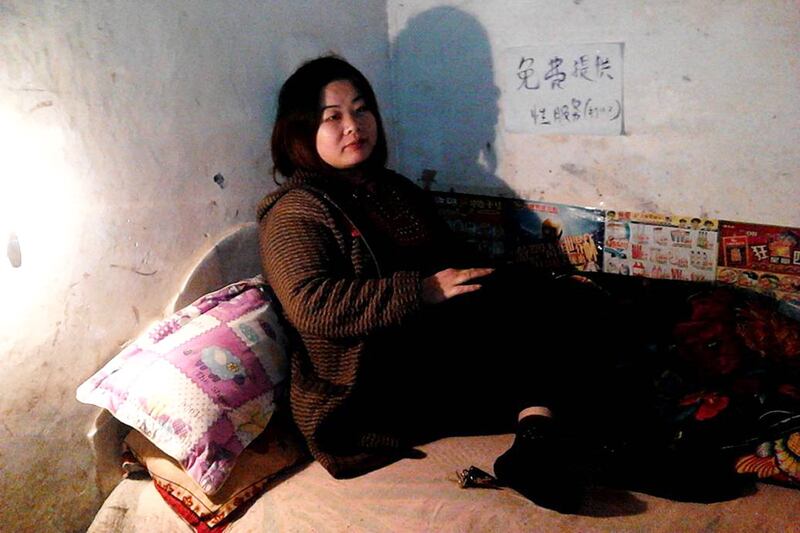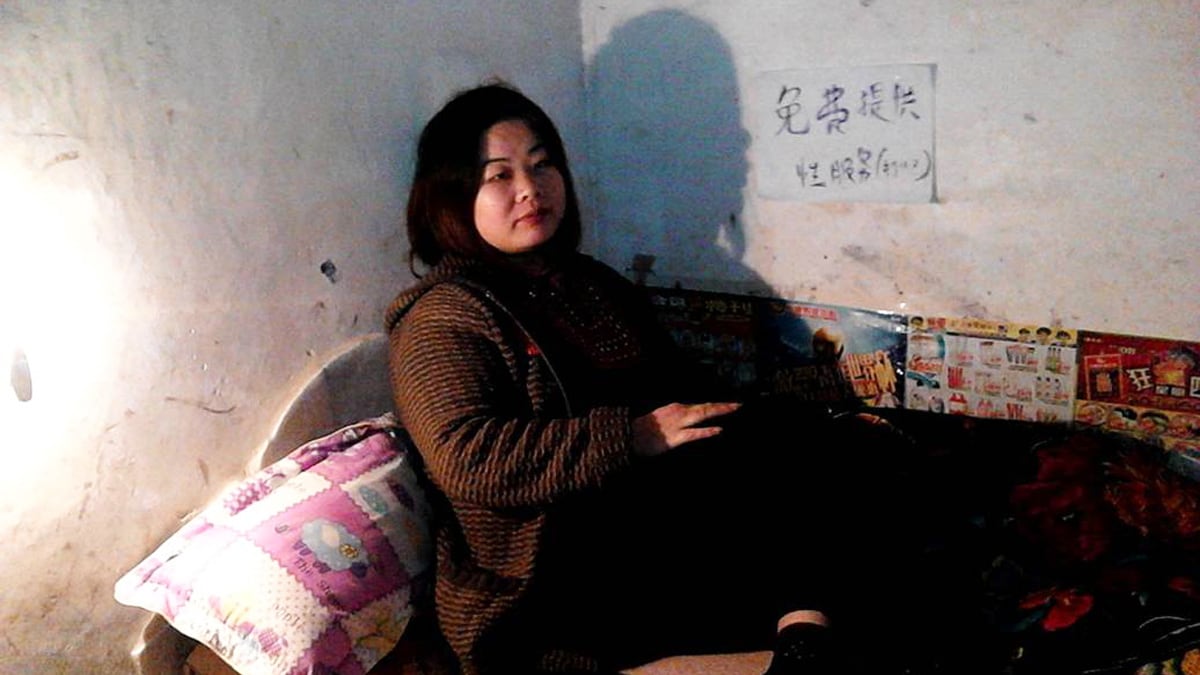A woman sits on small bed in a dingy room in a 10-yuan brothel staring in the distance. The painted white walls are marred by holes and smudges, with several pages of advertisements pasted on the lower side of the wall beside the bed.
The brothel is so-called because poor migrant workers can obtain sex here for just 10, 20, or 30 yuan, with 10 yuan amounting to about $1.50. A sign on the wall of this barren room, however, says “Sexual Services Provided for Free.”
Ye Haiyan, the occupant of the small room, does not look like one of the regulars here, a group that is mostly made up of older prostitutes in their 40s and 50s. Actually, Ye, 37, is a well-known advocate for the rights of sex workers and AIDS victims, and she came here in January to get a first-hand feel for the lives of the young women she’s been defending for years, and to show her compassion for the many poor men who frequent such brothels. Her commitment is such that she actually has sex with customers the way the prostitutes would.
Sitting in a small Beijing hotel room earlier this month after returning from a sex workers conference in the United States, Ye says that when she was younger, she was never biased against sex workers—feeling they were “just trying to make a living”—but at the same time, never thought much about their plight or their low position in society.
When she ran a legitimate massage parlor next door to a beauty parlor that was a front for a brothel, the prostitutes would come over and sit and chat. After they left, her staff would run over and wipe off the chairs, afraid they would get AIDS if they sat on them.
She began to take more of an interest in sex workers when she was the manager of a karaoke club, where she witnessed a sex worker being beaten by some men. “The police let the attackers go and did nothing for the victim,” she said.

After getting a divorce from her husband, the single mother, along with her young daughter, took up an offer to stay at the home of several sex workers in 2003. It was here that she began to hear the sad stories of these young women. The experience prompted her to start a website in 2005 to speak out for sex workers.
She says she was encouraged by the power of the Internet to help young women who were working in difficult circumstances in the sex industry.
“I wanted to give sex workers a place to express their opinions,” she says. “Other websites would kick people off if it was known that they were prostitutes. I felt I had a voice and that a lot of people could hear me. I felt I could make a contribution to society.”
Unfortunately, her blog drew the attention of angry hackers, some of whom called her a jitou, or chicken head, slang for a pimp (the word chicken rhymes with the word for prostitute in Chinese). With her website constantly under attack, and sometimes knocked off line, and finding herself engaging in bitter debates with her critics, Ye became discouraged, and began to think about giving up her campaign.
But then she learned of the murder of a young prostitute named Yaoyao, who had been an active contributor to her website—and who was just 23 when she died.
“I was tired and people were opposing me and attacking me every day,” she says. “But the death of Yaoyao gave me the determination to carry on. I felt their vulnerability for the first time. I began to understand their lives even better, and it was frightening.”
In 2006 she established the China Grassroots Women’s Rights Center in Wuhan. She sold Chinese medicine and wrote articles to earn money to keep the organization running, but piled up a debt of some 30,000 yuan (about $4,700). Ye tried to register as an NGO, but could not find a government agency to support her organization, which was a requirement for registration. She jokingly says she thought of turning to prostitution to earn money.
She says she also had her supporters, from the well-known artist/activist Ai Weiwei, to simple migrant workers, coal miners, minorities, and even some police officers. The poor were her biggest supporters, some earning as little as 1,000 yuan a month but donating money to her.
In the summer of 2010, Ye worked with sex workers in her hometown to organize what is believed to have been the first protest of its kind when a number of the women began asking people to sign a petition calling for an end to discrimination against sex workers and the revocation of laws against prostitution.
The police began to notice Ye in 2009, worried about her advocacy of the rights of women, and they began to invite her for tea, a euphemism for interrogation. This monthly process continued until 2011, when she was forced to leave Wuhan to return to Guangxi, the place where she had been married.
Ye, a leading critic of the criminalization of prostitution, says the prostitution law discourages sex workers from using condoms because the police see possession as evidence of prostitution—resulting in risk to the health of these women and their customers. Furthermore, she says sex workers are reluctant to report crimes, violence, or other abuses at the hands of customers for fear of being arrested.
An added problem is that if caught, prostitutes face high fines or even imprisonment—a huge major blow for these poor women, many of whom come from poor rural areas with little education or skills.
“If they don’t do this, what can they do?” she says. “They don’t have many alternatives.”
She accuses the police of exploiting poor women: “First you hoodlum robbers push these women into a corner and you still want to extort their money?” she wrote on her blog. “Isn’t this a bit too ruthless?”
She estimates that there are no fewer than 5 million prostitutes in China working in brothels, massage parlors, karaoke bars, and hotels, or walking the streets.
While her work has won her the respect of international organizations focused on the rights of sex workers—she recently returned from conferences in the United States and India—she has constantly come under attack at home.
Last year she moved to Yulin, in Guangxi, where she set up her new center in an area full of places offering sex. “I wanted to put an end to the prejudices and improve the situations of sex workers,” says the activist, who only completed junior-high school.
She called the center Fuping Health Workshop; fuping is Chinese for duckweed, a plant known for remaining strong and vital while continuously floating, a characteristic she says sex workers also have.
But her troubles didn’t end.
Just before the opening of the National People’s Congress in March, she says, she received several threatening calls, demanding she shut her office. That same month, the office signboard was destroyed.
In May, eight men barged in and ransacked her small NGO office in Bobai County, Guangxi province, knocking over a cabinet that held condoms and furniture and attacking Ye. She points to marks on her arms and a scar on her leg that are still there two months after she was attacked. Ye says she has no idea who the men were, but supposes they were from the local government.
Ye, who blogs under the name Hooligan Swallow (her Chinese name is the character for the bird), wrote about her experiences throughout her two-day stay in the brothel, making posts on several sites, some of which were deleted. She served four customers aged 18 to 50. Her first customer was a shy young man. After she asked him whether he was a virgin, how much he could pay, and his age, he turned to leave. She called him back, telling him it was for free. She proceeded to help him to put on a condom, advising him to always bring one when he visited a brothel.
She wrote of hugging one shy customer to warm him up, quoting him as saying she was the “kindest woman” he’d ever met.
Ye described the poor condition of another of her customers, a peasant worker whose clothes were in tatters. “I hugged him and my heart was full of sorrow,” she wrote. “Could it be that he didn’t even have time to mend the holes in his clothing?”
And she blogged about one “sister” whom she saw taken away by the police. She says the young sex worker, who worked quite hard to earn money, was about to return home for the Chinese New Year holiday—the most important Chinese holiday of the year—as soon as she finished shampooing her hair. Unfortunately, the police came before she could leave. To win release, she had to pay a fine of 3,000 yuan, the equivalent of having sex with 150 men at the low-end brothels.
“I was so sad that I couldn’t help her, and I was embarrassed to look at her. I felt useless,” she wrote on her blog. “I watched my sisters being plundered by the police and there was nothing I could do to help them.”
“Sex workers serve the sexual needs of peasant workers in these hidden spots, while at the same time ensuring their own economic survival,” she wrote. “What does the Chinese government do for them?”
Despite the constant pressure of advocating for the rights of sex workers and AIDS victims, and the physical danger she’s faced, Ye remains unswerving.
“If you feel that what you’re doing is right, then there’s nothing to fear,” she says.






